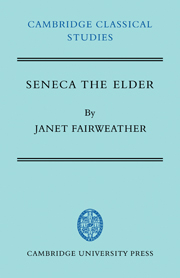Book contents
- Frontmatter
- Contents
- Preface
- Abbreviations
- PART I THE PLACE OF SENECA THE ELDER IN LITERARY HISTORY
- PART II SENECA THE ELDER ON THE HISTORY OF ELOQUENCE
- PART III FIVE ASPECTS OF DECLAMATION: THE ELDER SENECA'S EVIDENCE
- 1 Inventio
- 2 Dispositio
- 3 Elocutio
- 4 Memoria
- 5 Actio
- PART IV THE PLACE OF EARLY IMPERIAL DECLAMATION IN LITERARY HISTORY: THE ELDER SENECA'S EVIDENCE
- Indexes
- Frontmatter
- Contents
- Preface
- Abbreviations
- PART I THE PLACE OF SENECA THE ELDER IN LITERARY HISTORY
- PART II SENECA THE ELDER ON THE HISTORY OF ELOQUENCE
- PART III FIVE ASPECTS OF DECLAMATION: THE ELDER SENECA'S EVIDENCE
- 1 Inventio
- 2 Dispositio
- 3 Elocutio
- 4 Memoria
- 5 Actio
- PART IV THE PLACE OF EARLY IMPERIAL DECLAMATION IN LITERARY HISTORY: THE ELDER SENECA'S EVIDENCE
- Indexes
Summary
A finished controversia normally consisted of four main sections: the principium or prooemium (e.g. Contr. I.1.24f.); the narratio (e.g. Contr. 1.1.21); the argumenta or argumentatio (e.g. Contr. 1.6.9; II.2.12) and the epilogus (e.g. Contr. IV pr. 8). A suasoria did not require a narratio, and so seems to have consisted simply of a principium (e.g. Suas. 7.14) followed by various quaestiones, and presumably some kind of conclusion (see e.g. Contr. VII.7.19, quoted below), though Seneca does not in fact mention any epilogus in his extant surveys of suasoriae. Seneca assumes a knowledge of the nature and functions of these sections of a declamation, and restricts his attention to details of treatment and departures from the norm.
About the prooemium he has little to say. There is an interesting reference, though, in Contr. VII.7.19, to the way Cestius criticized his pupils when they used an unsubtle trick which he called echo, that is, when they opened a declamation with a quotation which they would bring in once more at the end:
illud et in hac controversia et in omni vitandum aiebat Cestius, quotiens aliqua vox poneretur, ne ad illam quasi ad sententiam decurreremus. sicut in hac apud Cestium quidam auditor eius hoc modo coepit: ‘ut verbis ducis vestri, iudices, incipiam, cavete proditionem’; sic finivit declamationem ut diceret: ‘finio quibus vitam finit imperator: cavete proditionem.’ […]
- Type
- Chapter
- Information
- Seneca the Elder , pp. 179 - 189Publisher: Cambridge University PressPrint publication year: 1981

